WITNESS RADIO MILESTONES
Bunyoro’s displaced in throes of despair
Published
6 years agoon
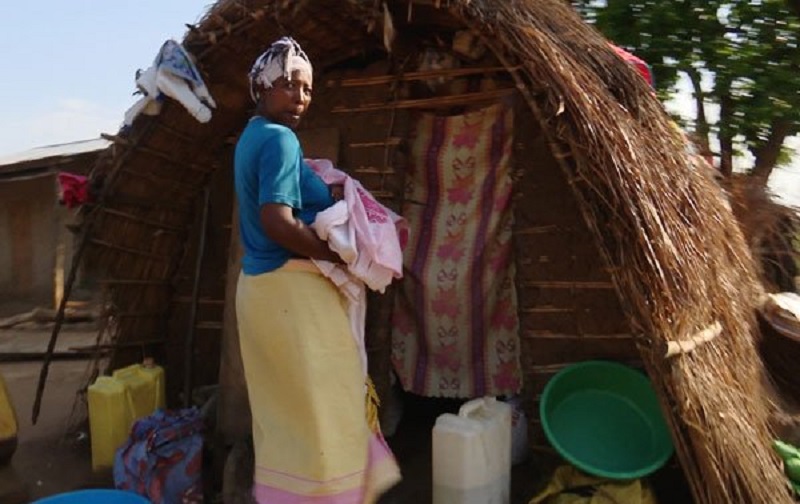
It is around 4pm when my cameraman and I arrive at Kijayo internally displaced peoples’ camp in Kikuube District, Bunyoro sub-region.
The children in the camp appear haggard and emaciated. They have not had a meal since morning and many are lying on empty and rumbling stomachs as they attempt to suppress the hunger pangs. Their families no longer have land to grow food after evictions started in 2012.
This is after Hoima Sugar Ltd, owned by Kenyan investors, purchased the contested nine square miles of land from Bunyoro Prince Herbert Kimera Rwakiswaza in 2011 to plant sugarcane in the new district of Kikuube, recently carved out of Hoima District.
The project has since left thousands of residents in the villages of Kijayo, Ikoba, Muziranduuru, Kyabataka, Kadiki, Kyakasoro and Kabango displaced and scores dead after the violent eviction on February 20, 2015.
Among those who died from their injuries were Augustine Karamira, Evylene Turyagumanawe, George Bangirana, and Francis Matovu. Matovu’s wife and three children were hacked to death using machetes. Others are Matia Mulumba, Aidah Kyarukunda, Wilson Singwire, Nakyanzi Akankunda wife to Erias Muganyizi, Hakim Sudayisi, Kiggundhu Adibayo son to Hamad Mwongerwa and Powerson Mugarura.
Deaths
The chairperson of the project-affected persons, Mr Asaba Muhereza, says in total, 26 people died, largely as a result of wounds they suffered after the attack.
The affected families now live in squalor in mud and wattle structures and others have constructed shacks adjacent to the area where they evicted. The piece of land was offered by the Local Council chairperson, Mr Edward Kasigwa, for free.
“I do not understand the way this government works; they provide all the necessary social services to refugees but we Ugandans are not catered for yet we vote them. They cannot even provide burial grounds for them that I have to bury them on my land,” reveals Mr Kasigwa.
Ms Joy Nerimasi is at pains to reveal that the graves of her husband and children were destroyed by the sugar company.
“My husband, including seven children, died but now all their graves cannot be traced; the company has planted sugarcane on them,” says Ms Nerimasi.
She lives here with her granddaughter and cannot afford to feed, clothe and take her to school. They lack adequate shelter when torrential rains pound.
Ms Nerimasi and others were forcibly evicted as police, using teargas and batons, set their homes ablaze.
She wants to return to Kijayo where she was born.
Living in shacks
Ms Gorret Kushemereire is another victim who reveals that her husband and children were killed during the eviction.
“I came from Fort Portal many years ago and we bought land here. During the forceful eviction, my husband and some of my children died while others disappeared. I cannot trace them now,” says Ms Kushemereire.
“We now sleep in shacks and my only son who would be helping me out cannot be traced,” she adds.
Ms Kushemereire says government has not been of help. “Our children cannot go to school and pregnant mothers have challenges of accessing health facilities. I continue to wonder whether I am a Ugandan or a foreigner. Why would government care about refugees and give them land instead of us nationals?”
There is barely any government presence here. Authorities from the Ministry of Disaster Preparedness in the Office of the Prime Minister or Hoima District have not come to the people’s aid to provide them with clean water, food and tarpaulin. Ms Esther Turyahebwa also sleeps in a shack with her husband and seven children. “As a woman, I need privacy with my husband but this is impossible and as we talk now, my neighbours who went to dig to get food have not returned and all the children are very hungry, they have not had anything to eat,” says Ms Turyahebwa.
Many children have dropped out of school because they have to trek long distances to study. Hoima District Chief Administrative Officer (CAO) Nathan Lujumwa told Daily Monitor that they have not acted because the matter is in court.
“Our hands are tied,” he said.
Mr Lujumwa, however, said the investor has compensated some of the claimants.
“We shall continue to push the investor to ensure that they compensate these people,” he added.
It is not yet clear why the district could not provide humanitarian aid to end the plight of the displaced as they await the court verdict.
As a result of pent-up frustration, Ms Harriet Kokwera, 78, has petitioned the President, protesting her eviction.
In April, the Permanent Secretary in the Ministry of Local Government compelled Mr Lujumwa, to follow up Ms Kokwera’s complaint. The CAO responded in his July 11 letter, saying attempts by the Hoima RDC to intervene have not yielded tangible results. “When I approached the investors of Hoima Sugar Ltd, they seemed not to know about Harriet Kokwera. After a couple of weeks, they responded to me in a letter, saying Kokwera was not a genuine claimant,” Mr Lujumwa’s letter reads in part.
Her eviction has sucked in State House, which isolates her concern from scores also affected by the eviction.
Daily Monitor has obtained a copy of an August 8 letter signed by Ms Flora Kiconco on behalf of the Principal Private Secretary to the President, Ms Molly Kamukama. The letter directs the Hoima RDC to investigate Ms Kokwera’s complaint and ascertain whether she owned a piece of land and whether she was compensated before her eviction.
In September 2017, the manager in-charge of land acquisition at Hoima Sugar Ltd, Mr Ramadus Raja Khasharan, appeared before the Commission of Inquiry into Land Matters chaired by Justice Catherine Bamugemereire.
Mr Khasharan dismissed allegations that the company evicted residents from the land.
He claimed that some of the residents settled on the land after the company had purchased it from Prince Kimera. “We have not evicted anyone,” he said.
However, the Commission established that some residents who agreed to receive compensation were paid as low as Shs30,000 for half an acre.
Though some families at Kijayo were not affected by the eviction, they continue to live in misery, earning a pittance for their toil at the sugar plantations.
In 2012, the High Court in Masindi issued a temporary injunction, halting the eviction of the locals until the main suit is disposed off. However, the investor flagrantly rejected the orders to evict these families. Though the hearing of the main suit ended in 2016, judgment is yet to be delivered. Judge Simon Byabakama, who presided over the case, has since then been appointed chairperson of the Electoral Commission.
Company accused
Buhaguzi County MP Daniel Muhairwe said the sugar company used corruption and impunity to force people off their land.
Sources revealed to Daily Monitor that some officials in Hoima Sugar Ltd have close ties with power brokers in State House.
Daily Monitor has also established that the Bamugemereire-led commission is seeking mediation between the investor and the claimants.
Hoima District Land Board has distanced themselves from the Kijayo land allocation to the investors. Mr Yostus Ireba, the chairperson of the district land board, says: “I have never reached that place because of the nature of our work. Our board has no transport to investigate such cases.”
He adds that the district land board is not responsible for the conflict because the land belonged to a private person who decided to sell it to investors.
However, Mr Ireba is concerned about the conditions in which these landless Ugandans are living in. “Those are our people; why should they be displaced?” he said.
Bunyoro Kingdom prime minister Andrew Kirungi Byakutaaga says there has been a scramble for land since the discovery of oil and gas. He says many of the kingdom subjects have been arbitrarily evicted.
“We have been asking government to mitigate the challenges that arise as a result of such evictions,” he says.
Bunyoro’s historical land problems have spilled over after the discovery of oil, throwing the locals into the throes of despair.
Related posts:
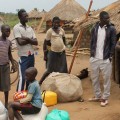
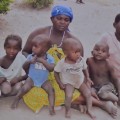 Land grabbing is costing children’s right to food and education in Mubende
Land grabbing is costing children’s right to food and education in Mubende
 Government ordered to resettle displaced Banyabindi in Kasese
Government ordered to resettle displaced Banyabindi in Kasese
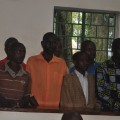 Villagers displaced by Neumann Kaffee’s plantation face another land grab in Mubende, Uganda
Villagers displaced by Neumann Kaffee’s plantation face another land grab in Mubende, Uganda
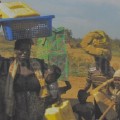 Land Inquiry Commission opens investigations into the eviction of natives from former government ranches in Bunyoro sub-region
Land Inquiry Commission opens investigations into the eviction of natives from former government ranches in Bunyoro sub-region
You may like
-


Private prosecution: Army General, police commander, presidential representative and others to be charged with over seven offenses committed while illegally evicting locals to give way to EACOP.
-


Six cattlemen opposed to the Tilenga oil project-related forced land eviction have been granted bail but will remain in prison…
-
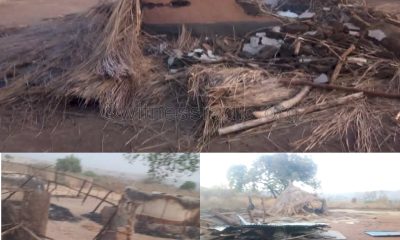

The district security committee continues to defy gov’t’s directive to return locals to their land 48 days later.
-
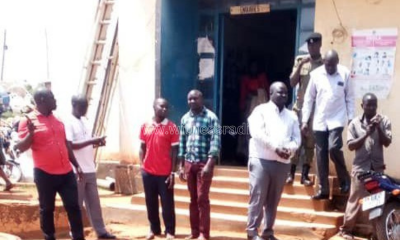

State House Anti-Corruption Unit nets a surveyor implicated in Mubende district land-grabs
-
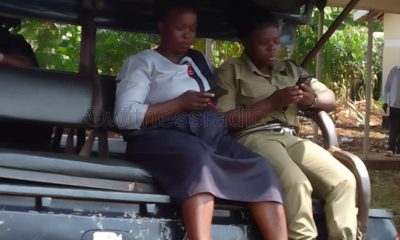

Kiboga district senior lands officer is arrested and detained over land fraud.
-


Community land rights defenders that have been on trial since 2020; are set to return to court this January.
MEDIA FOR CHANGE NETWORK
Young activists fight to be heard as officials push forward on devastating project: ‘It is corporate greed’
Published
3 months agoon
August 27, 2025
“We refuse to inherit a damaged planet and devastated communities.”
Youth climate activists in Uganda protesting the East African Crude Oil Pipeline, or EACOP, are frustrated with the government’s response to their demonstration as the years-long project moves forward.
According to the country’s Daily Monitor, youth activists organized with End Fossil Occupy Uganda took to the streets of Kampala in early August to protest EACOP. The pipeline, under construction since about 2017 and now 62 percent complete, is set to transport crude oil from Uganda’s Tilenga and Kingfisher fields through Tanzania to the Indian Ocean port of Tanga by 2026.
Activists noted the devastating toll, with group spokesperson Felix Musinguzi saying that already around 13,000 people “have lost their land with unfair compensation” and estimating that around 90,000 more in Uganda and Tanzania could be affected. End Fossil Occupy Uganda has also warned of risks to vital water sources, including Lake Victoria, which it says 40 million people rely on.
The group has been calling on financial institutions to withdraw funding for the project. Following a demonstration at Stanbic Bank earlier in the month, 12 activists were arrested, according to the Daily Monitor.
Some protesters were seen holding signs reading “Every loan to big oil is a debt to our children” and “It’s not economic development; it is corporate greed.”
Meanwhile, the regional newspaper says the government has described the activist efforts as driven by foreign actors who mean to subvert economic progress.
EACOP’s site notes that its shareholders include French multinational TotalEnergies — owning 62 percent of the company’s shares — Uganda National Oil Company, Tanzania Petroleum Development Corporation, and China National Offshore Oil Corporation.
The wave of young people taking action against EACOP could be seen as a sign of growing public frustration over infrastructural projects that promise economic gain while bringing harm to local communities and ecosystems. Activists say residents face costly threats from pipeline development, such as forced displacement and the loss of livelihoods.
Environmental hazards to Lake Victoria could also disrupt water supplies and food systems, bringing the potential for both financial and health impacts. Just 10 years ago, an oil spill in Kenya caused a humanitarian crisis. The Kenya Pipeline Company reportedly attributed the spill to pipeline corrosion, which led to contamination of the Thange River and severe illness.
The EACOP project has already locked the region into close to a decade of development, and concerns about the pipeline and continued investments in carbon-intensive systems go back just as long. Youth activists, as well as concerned citizens of all ages, say efforts to move toward climate resilience can’t wait. “As young people, we refuse to inherit a damaged planet and devastated communities,” Musinguzi said, per the Monitor.
Source: The Cool Down
Related posts:

 Put people above profits – Climate Activists urge Total to defund EACOP
Put people above profits – Climate Activists urge Total to defund EACOP
 EACOP: The number of activists arrested for opposing the project is already soaring in just a few months of 2025
EACOP: The number of activists arrested for opposing the project is already soaring in just a few months of 2025
 EACOP activism under Siege: Activists are reportedly criminalized for opposing oil pipeline project in Uganda.
EACOP activism under Siege: Activists are reportedly criminalized for opposing oil pipeline project in Uganda.
 The East African Court of Justice fixes the ruling date for a petition challenging the EACOP project.
The East African Court of Justice fixes the ruling date for a petition challenging the EACOP project.
WITNESS RADIO MILESTONES
Why matooke farming is losing ground in Bukedi
Published
3 months agoon
August 27, 2025
On a humid morning in Namusango Village, Kamonkoli South Ward, Kamonkoli Town Council in Budaka District, 58-year-old farmer James Kainja walks at the edge of what used to be his flourishing matooke garden. For generations, the green banana plant—matooke—stood tall in Uganda’s farmlands, its broad leaves swaying in the wind and its heavy bunches promising a warm, hearty meal. But in Bukedi Sub-region today, that story is fading. Between the tired banana stools, spear grass has taken over. A few bunches hang small and low quality. “We used to harvest every week,” Mr Kainja says, dusting his palms.
“Now, it is once in a while and the money is not worth the struggle,” he adds. Across Bukedi, particularly in Pallisa, Budaka, Butebo, and Kibuku, the banana plants are shrinking back, replaced by maize, cassava, rice, and other faster-growing crops. The sub-region that once sent truckloads of matooke to nearby districts now measures its banana harvest in small piles under tarpaulin. Where the green canopy of banana leaves once dominated, the landscape has changed. For many farmers, the decision is not about abandoning tradition but about survival.
Matooke as culture
In many Bukedi households, matooke still holds cultural value, especially during weddings, funerals, and community gatherings. But with fewer plantations, sourcing enough bunches has become harder and more expensive. Matooke is now imported into Bukedi from Mbale and Mbarara. Mr Abubakar Nanghejje, an elder in Kibuku, warns: “If this trend continues, our children may only know matooke from stories. We are losing more than a crop—we are losing a piece of who we are.”
He adds that matooke, once abundant, is now a luxury: “People only access matooke during ceremonies because the cost of a bunch has turned expensive,” he explains. Within Kibuku Town Council, women sell matooke in pieces: three or four fingers for Shs1,000, while a complete bunch costs between Shs30,000 and Shs35,000. This contrasts sharply with central and western Uganda, where matooke is more than a crop—it is an identity, a culture, and a livelihood. Yet across the country, banana plantations are thinning out, replaced by maize, beans, or simply abandoned.
Farmers’ voices
Mr Peter Mwigala, a 73-year-old farmer from Bubulanga Village, recalls with nostalgia: “I grew matooke for 30 years. But now my plantation is less than half what it used to be. The pests are too many, the prices are too low, and the rains are no longer reliable.” His story echoes across villages, evidence of a slow, steady decline in matooke production. This decline has unfolded over two to three decades, rather than as a sudden collapse. Agricultural researchers point to several reasons. Among them, banana bacterial wilt (BBW), banana weevils, and nematodes that have devastated plantations in major banana-growing areas. These pests cause premature ripening, rotting, and eventual uprooting of infected plants.
“When wilt enters your plantation, you can lose everything in one season,” says Mr Abner Botiri, an agriculture officer in Budaka. He further explains that erratic rainfall and prolonged dry spells also take a toll. Matooke thrives in consistent moisture, but under drought stress it yields smaller bunches. Repeated losses have led some farmers to abandon the crop entirely. Continuous cultivation without soil management has also depleted many banana-growing soils. Beyond agronomic challenges, the economics of matooke farming have shifted dramatically. Local market prices fluctuate widely depending on supply, while transport costs have risen sharply.
Mr John Gwanyi, a 71-year-old farmer, recalls: “In the 1980s and 1990s, matooke farmers could educate children through primary, secondary, and tertiary levels, and still cover basic needs. Today, a whole plantation might not pay for one term’s school fees.” Urbanisation has worsened the trend. Younger generations moving to towns now eat rice, spaghetti, and bread more frequently.
The once sacred matooke meal is no longer the undisputed centrepiece of Ugandan dining tables. Meanwhile, land fragmentation leaves families with smaller plots, unable to sustain large banana plantations. In some areas, higher-value or quicker-return crops like coffee, passion fruit, or maize dominate. As one agricultural economist notes: “A bunch of matooke takes nine months to mature, but maize can be ready in three months. For cash-strapped farmers, that difference matters.
Government interventions
Government and research institutions have made several attempts to address the situation. The National Agricultural Research Organisation (NARO) has introduced resistant banana varieties and promoted good agronomic practices. NGOs are training farmers in mulching, proper spacing, and integrated pest management. Still, the decline carries a cultural weight. In Buganda, for instance, matooke is central to marriage ceremonies, community gatherings, and daily life.
“When you serve matooke at a function, it shows respect,” explains Mr Badiru Kirya, a cultural leader in Obwa Ikumbania bwa Bugwere. Yet, Mr Kirya attributes part of the decline to newer banana varieties introduced by research agencies. “The old varieties planted by our grandparents could withstand weather changes better. These new varieties are weaker against climate volatility,” he says. He also notes that soil infertility and population pressure have accelerated the decline, as families squeeze more onto smaller pieces of land.
National standing
Uganda remains one of the world’s largest banana consumers, with per capita consumption estimated at 250–300 kg annually in some regions. Yet, national banana production has generally declined. According to the Uganda Bureau of Statistics (UBOS) 2024 census, only 27.1 percent of households participate in banana cultivation. Dr Sadik Kassim, the NARO deputy director general in-charge of agricultural promotion, highlights several factors. “Soil fertility has gone low, while pests and disease build-up have grossly affected matooke gardens. Erratic rainfall and climate change further reduce yields.
Poor agricultural practices have made the decline worse,” he says. However, Dr Kassim dismisses the claim that new technologies are to blame. Similarly, Dr Rabooni Tumuhimbise, the director of research at Rwebitaba Zonal Agricultural Research and Development Institute, said: “As of now, I am not aware that Bukedi has registered a decline in banana production. This needs verification before conclusions.” But farmers and local leaders insist the reality is clear: matooke is disappearing from Bukedi. Mr Arthur Wako Mboizi, a seasoned politician and opinion leader, argues: “Bukedi has drastically registered a total decline in banana production due to various factors, including soil infertility, diseases, and erratic rainfall.”
Efforts are underway to add value. Under the Presidential Initiative on Banana, NARO and Kilimo Trust have developed matooke-based products such as flour, bread, and cakes. More than 13 million Ugandans consume bananas as their staple, and 75 percent of farmers grow them, contributing nearly $440 million annually to the economy. Yet, for Bukedi, the reality is sobering. The once proud producer of matooke is a shadow of its former self. As Mr Nanghejje, the Kibuku elder, put it: “We are losing more than a crop. We are losing a piece of who we are.”
Background
In 2024, national banana production was estimated at 6 million tonnes annually, 70 percent of which was consumed at household level and 30 percent sold.
The Banana Merchandise Trade Statistics Bulletin (2024) shows export earnings rose from $2.1 million in June 2023 to $2.4 million in June 2024. Still, yields remain below potential—currently 5–30 tonnes per hectare compared to an attainable 60–70 tonnes. Uganda’s banana losses to wilt disease are massive, with officials estimating a 71.4 percent loss of potential harvest annually, worth nearly $300 million.
Source: Monitor
Related posts:

 Govt injects Shs47b into cassava growing in Bukedi
Govt injects Shs47b into cassava growing in Bukedi
 Uganda’s natives are becoming more powerless; losing land everyday, says a New Research Report
Uganda’s natives are becoming more powerless; losing land everyday, says a New Research Report
 Omoro farmers task Naro on crop varieties
Omoro farmers task Naro on crop varieties
 Uganda losing agricultural advantage to neighbours – UN.
Uganda losing agricultural advantage to neighbours – UN.
MEDIA FOR CHANGE NETWORK
Cases against anti-EACOP activism are skyrocketing in Uganda. Witness Radio has documented close to 60 cases in the last eight months.
Published
3 months agoon
August 7, 2025
By the dedicated efforts of the Witness Radio team.
The Witness Radio team has documented nearly 60 cases of arrest, detention, and prosecution targeting activists protesting the East African Crude Oil Pipeline (EACOP) since January 2025.
The $5 billion EACOP project, led by TotalEnergies and its partners, involves the construction of a 1,444km heated pipeline from Hoima in Uganda to Tanga in Tanzania. This pipeline, which will transport crude oil from the Tilenga and Kingfisher fields, has been a subject of controversy due to its potential environmental and social impacts.
As activism against the EACOP Project grows in Uganda, youth activists leading the cause face strong resistance from the government and its agents, who are pushing for the development of oil activities, including EACOP. Their bravery in the face of such adversity is truly inspiring.
The activists have continuously been suppressed and weakened with torture, unlawful arrests, and prolonged detentions accompanied by unscrupulous charges. The injustice they face is a call for empathy from all who hear their story.
The latest incident happened on Friday, August 1, 2025, when the police brutally arrested 12 environmental activists at Stanbic Bank Headquarters in Kampala. The urgency of the situation is apparent, as the activists were protesting against the bank’s financing of the EACOP project.
On March 26, 2025, EACOP Ltd., the company in charge of the construction and future operation of the EACOP project, announced new project financing from regional banks such as Stanbic Bank Uganda Limited, KCB Bank Uganda, African Export-Import Bank (Afreximbank), the Standard Bank of South Africa Limited, and the Islamic Corporation for the Development of the Private Sector (ICD). The announcement sparked widespread alarm and outcry, with activists urging the banks to immediately withdraw their support and halt the financing of the project.
These activists, individuals from Civil Society Organisations (CSOs) and environmental enthusiasts, strongly oppose the implementation of the EACOP project. They cite its harmful effects, including the displacement of thousands of people, damage to sensitive ecosystems, a threat to water resources, and exacerbating climate change mainly through carbon emissions. They argue that the short-term economic benefits do not justify these long-term consequences.
In doing their work, they have ended up in the hands of the authorities with numerous charges slapped against them. The latest remandees include Teopista Nakyambade, Shammy Nalwadda, Dorothy Asio, Shafik Kalyango, Habibu Nalungu, Noah Kafiiti, Ismael Zziwa, Ivan Wamboga, Akram Katende, Baker Tamale, Keisha Ali, and Mark Makobe.
On the same day of their arrest, the victims were arraigned before the Buganda Road Chief Magistrate Winnie Nankya, who charged them with common nuisance. She later remanded them to Luzira prison until August 18, 2025.
Section 160 of the Penal Code Act, Cap 120 states that a person convicted of common nuisance faces a one-year imprisonment.
In response, the Stanbic Bank manager for corporate communications, Mr. Kenneth Agutamba, confirmed that the bank is financing the EACOP project, justifying that it aligns with and balances environmental sustainability and economic development in the country.
Ever since this year started, Witness Radio has documented 56 cases of arrests and illegal detentions of EACOP activists, with most of them being charged with common nuisance. Below is a chronology of these incidents as they happened.
| Date | Incident | Charge |
| 26th Feb. 2025 | 11 activists were arrested while marching to the European Union offices deliver a petition concerning TotalEnergies’ involvement in harmful fossil fuels in Uganda. | Common nuisance |
| 19th Mar. 2025 | 4 activists were arrested while marching to the Parliament of Uganda to deliver a petition to the speaker, Anita Annet Among, in protest of the ongoing construction of the EACOP Project. | Common nuisance |
| 2nd April, 2025 | 9 activists were arrested while marching to Stanbic bank offices. | Common nuisance |
| 23rd of April, 2025 | A group of 11 activists were arrested as peacefully went to deliver a petition to KCB Uganda offices challenging its will to fund the EACOP project. | Criminal trespass. |
| 21 May 2025 | 9 activists arrested while protesting KCB financing of the EACOP | Common nuisance. |
| 1 Aug. 2025. | 12 activists arrested for protesting the Stanbic bank funding. | common nuisance |
According to Witness Radio’s special report, “Activism on Trial: Despite the increasing repressive measures, Uganda’s EACOP Protesters are achieving unexpected victories in the country’s justice systems,” released last month, a case review revealed that while Uganda’s justice system is being used to suppress the activities of youth activists opposing the EACOP project, many of these cases have lacked merit and were ultimately dismissed.
The report found that none of the activists had been convicted, though they continue to face prolonged court processes marked by repeated adjournments. “Of a sample of 20 documented cases since 2022 involving the arrest of over 180 activists, 9 case files have either been dismissed by the courts or closed by the police due to lack of prosecution, another signal indicating the relevance and legitimacy of their work, while 11 cases remain ongoing,” the report noted.
Related posts:

 EACOP activism under Siege: Activists are reportedly criminalized for opposing oil pipeline project in Uganda.
EACOP activism under Siege: Activists are reportedly criminalized for opposing oil pipeline project in Uganda.
 Breaking: over 350,000 acres of land were grabbed during Witness Radio – Uganda’s seven months ban.
Breaking: over 350,000 acres of land were grabbed during Witness Radio – Uganda’s seven months ban.
 EACOP: The number of activists arrested for opposing the project is already soaring in just a few months of 2025
EACOP: The number of activists arrested for opposing the project is already soaring in just a few months of 2025
 Crackdown on EACOP protesters intensifies: 35 Activists arrested in just four months.
Crackdown on EACOP protesters intensifies: 35 Activists arrested in just four months.

“Vacant Land” Narrative Fuels Dispossession and Ecological Crisis in Africa – New report.

Uganda’s Army is on the spot for forcibly grabbing land for families in Pangero Chiefdom in Nebbi district.

Climate wash: The World Bank’s Fresh Offensive on Land Rights

Africa’s Land Is Not Empty: New Report Debunks the Myth of “Unused Land” and Calls for a Just Future for the Continent’s Farmland

StopEACOP Coalition warns TotalEnergies and CNOOC investors of escalating ‘financial and reputational’ Risks

Seed Boot Camp: A struggle to conserve local and indigenous seeds from extinction.

Know Your Land rights and environmental protection laws: a case of a refreshed radio program transferring legal knowledge to local and indigenous communities to protect their land and the environment at Witness Radio.

Failed US-Brokered “Peace” Deal Was Never About Peace in DRC

Innovative Finance from Canada projects positive impact on local communities.
Over 5000 Indigenous Communities evicted in Kiryandongo District
Petition To Land Inquiry Commission Over Human Rights In Kiryandongo District
Invisible victims of Uganda Land Grabs
Resource Center
- REPARATORY AND CLIMATE JUSTICE MUST BE AT THE CORE OF COP30, SAY GLOBAL LEADERS AND MOVEMENTS
- LAND GRABS AT GUNPOINT REPORT IN KIRYANDONGO DISTRICT
- THOSE OIL LIARS! THEY DESTROYED MY BUSINESS!
- RESEARCH BRIEF -TOURISM POTENTIAL OF GREATER MASAKA -MARCH 2025
- The Mouila Declaration of the Informal Alliance against the Expansion of Industrial Monocultures
- FORCED LAND EVICTIONS IN UGANDA TRENDS RIGHTS OF DEFENDERS IMPACT AND CALL FOR ACTION
- 12 KEY DEMANDS FROM CSOS TO WORLD LEADERS AT THE OPENING OF COP16 IN SAUDI ARABIA
- PRESENDIANTIAL DIRECTIVE BANNING ALL LAND EVICTIONS IN UGANDA
Legal Framework
READ BY CATEGORY
Newsletter
Trending
-

 MEDIA FOR CHANGE NETWORK2 weeks ago
MEDIA FOR CHANGE NETWORK2 weeks agoReport reveals ongoing Human Rights Abuses and environmental destruction by the Chinese oil company CNOOC
-

 SPECIAL REPORTS AND PROJECTS2 weeks ago
SPECIAL REPORTS AND PROJECTS2 weeks agoThe Environmental Crisis Is a Capitalist Crisis
-

 MEDIA FOR CHANGE NETWORK4 days ago
MEDIA FOR CHANGE NETWORK4 days ago“Vacant Land” Narrative Fuels Dispossession and Ecological Crisis in Africa – New report.
-

 SPECIAL REPORTS AND PROJECTS2 weeks ago
SPECIAL REPORTS AND PROJECTS2 weeks agoGlobal use of coal hit record high in 2024
-

 MEDIA FOR CHANGE NETWORK6 days ago
MEDIA FOR CHANGE NETWORK6 days agoSeed Sovereignty: Most existing and emerging laws and policies on seeds are endangering seed saving and conservation on the African continent.
-

 MEDIA FOR CHANGE NETWORK2 weeks ago
MEDIA FOR CHANGE NETWORK2 weeks agoLands ministry rejects call to save over 300 Masaka residents facing eviction
-

 MEDIA FOR CHANGE NETWORK4 days ago
MEDIA FOR CHANGE NETWORK4 days agoUganda’s Army is on the spot for forcibly grabbing land for families in Pangero Chiefdom in Nebbi district.
-

 NGO WORK5 days ago
NGO WORK5 days agoDiscover How Foreign Interests and Resource Extraction Continue to Drive Congo’s Crisis
